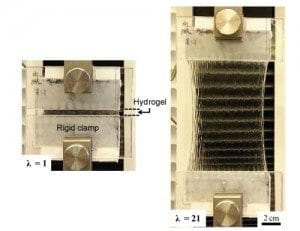Biocompatible material created at Harvard is much tougher than cartilage
A team of experts in mechanics, materials science, and tissue engineering at Harvard have created an extremely stretchy and tough gel that may pave the way to replacing damaged cartilage in human joints.
Called a hydrogel, because its main ingredient is water, the new material is a hybrid of two weak gels that combine to create something much stronger. Not only can this new gel stretch to 21 times its original length, but it is also exceptionally tough, self-healing, and biocompatible—a valuable collection of attributes that opens up new opportunities in medicine and tissue engineering.
The material, its properties, and a simple method of synthesis are described in the September 6 issue of Nature.
“Conventional hydrogels are very weak and brittle—imagine a spoon breaking through jelly,” explains lead author Jeong-Yun Sun, a postdoctoral fellow at the Harvard School of Engineering and Applied Sciences (SEAS). “But because they are water-based and biocompatible, people would like to use them for some very challenging applications like artificial cartilage or spinal disks. For a gel to work in those settings, it has to be able to stretch and expand under compression and tension without breaking.”
Beyond artificial cartilage, the researchers suggest that the new hydrogel could be used in soft robotics, optics, artificial muscle, as a tough protective covering for wounds, or “any other place where we need hydrogels of high stretchability and high toughness.”
The Latest Streaming News: Hydrogel updated minute-by-minute
Bookmark this page and come back often
Latest NEWS
Latest VIDEO








